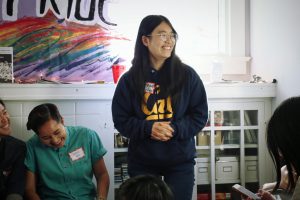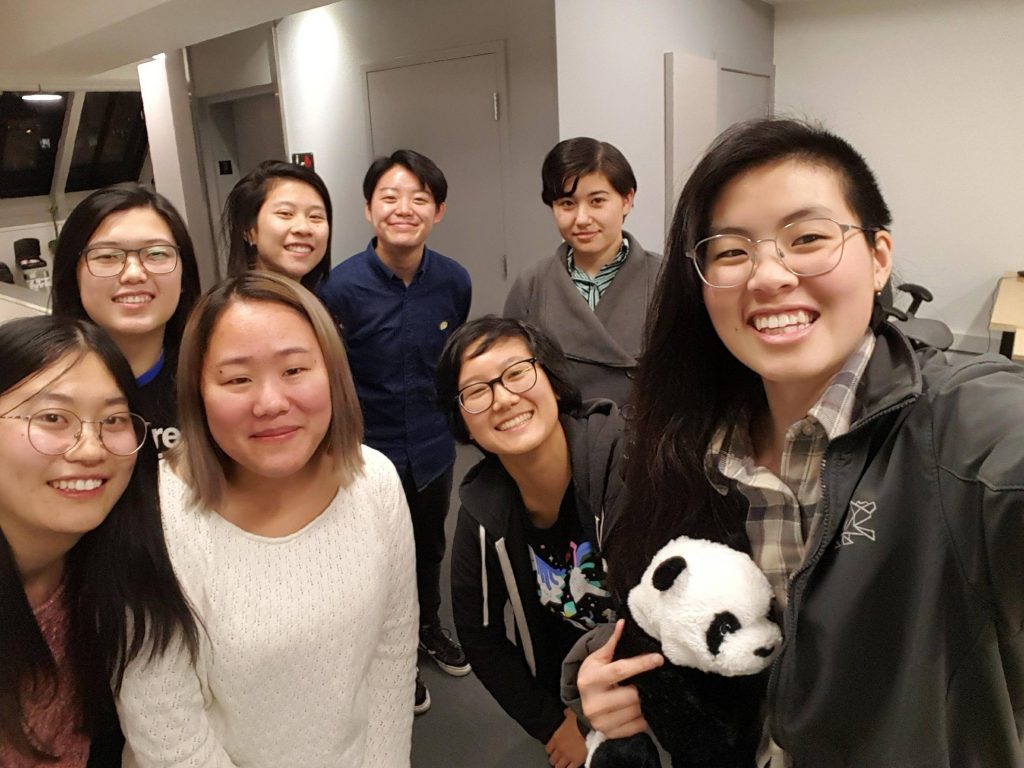What is My Movement: Reflections on my Journey in America
In 2017, APIENC hosted Panpan, a fellow who came to work with us from China through the Lingnan W.T. Chan Fellowship at UC Berkeley’s Public Service Center. During her 5 months at APIENC, Panpan facilitated APIENC’s first Chinese Study Group, created case studies on the LGBTQ movement in China, and built deep relationships with our community members. This reflection is adapted from Panpan’s final speech at her closing reception.
Hello everyone. I am Panpan, the 2017 Chan Fellow at APIENC. I am from China, and I will go back to China soon. When I look back at the past four months, I can’t believe I grew up so much here.
My time here has been an exploration. It has been an exploration of myself. I remember the moments I went to protests and rallies, which helped me understand the struggles and fights of people of different colors and races. I remember, the moments I facilitated a Chinese Study Group at APIENC, in which I shared about the LGBTQ movement in China. I remember, the moments I had weekly check-ins with MLin, and shared what I learned that week. It was in these moments that I realized for the first time, I am a Chinese Queer.

Before I came to America, I never thought that I had a home country. For me, it’s a man’s China, not my China. For me, China has many marginalized communities that I share similar life experiences with, but they are segregated from the mainstream world. I never felt that I had a home country. My experience here pushed me to reflect and reflect – “What does it mean to be Chinese? What does it mean to be a Chinese queer?”
One day, I visited the Rosie the Riveter Museum in Richmond and listened to a speech from Betty Sorskin about World War Ⅱ. During the war, because there was a need for labor, the government called on women to work, and they were able to enter the job force. But after the war, when men came back from the battlefield, most women were pressured to go back home and give up their jobs to men. I suddenly realized, what happened during the war in America is exactly what happened in Chinese history, and what is happening now. I suddenly knew why I was here, why I needed to learn about social movements in America: although we experience different conditions and violence, the logic of oppression is the same everywhere. After realizing the similarities between the two countries, the same can also be applied to queer and feminist theory! By understanding and learning in the U.S., I would have a deeper understanding about China, and would be able to reflect about the social movement in China.
These days, I reflect on the question, “What is movement?” I believe movement is about who we are and who we want to be. It is deeply rooted in our daily life. At APIENC, one of my main internship goals was to fundraise. Donna, my host mom, wanted to help me with my fundraising so she pushed me to share my story at our family dinner, in front of her sisters and father. It was such a scary challenge, but I knew it was important. Not just for money, it was important to have conversation with older generations and this was also my first time to come out to them. I began to share what I did and learned at APIENC, my connection with my community, and what it means to be a Chinese queer for me. I became very emotional and began to cry, but I continued to finish my story. After my story, we began to discuss LGBTQ issues around the dinner table. After our dinner, I saw an envelope on the table, with my name on it. When I opened it, I saw their donation and a card, they wrote on it, “Panpan, we are so proud of you.” I cried again! It was the night before an important presentation and even though I should have practiced my presentation, I just cried almost all night and texted MLin, Amy, and my other friends about what happened. I felt so powerful at that time, and I realized what is my movement, and why the personal is political. My movement is rooted in my daily life. That means I value my life experiences, I reflect on my life experiences, and I am honest to myself about who I am.

So reflecting back on my question, “What does it mean to be a Chinese queer?” I defined myself as a queer three years ago, but I never truly accepted myself until my time in the U.S. To be a Chinese queer is about acceptance. I realized that the more I spoke about myself, who I am and where I come from, I felt empowered and powerful in sharing with others.

